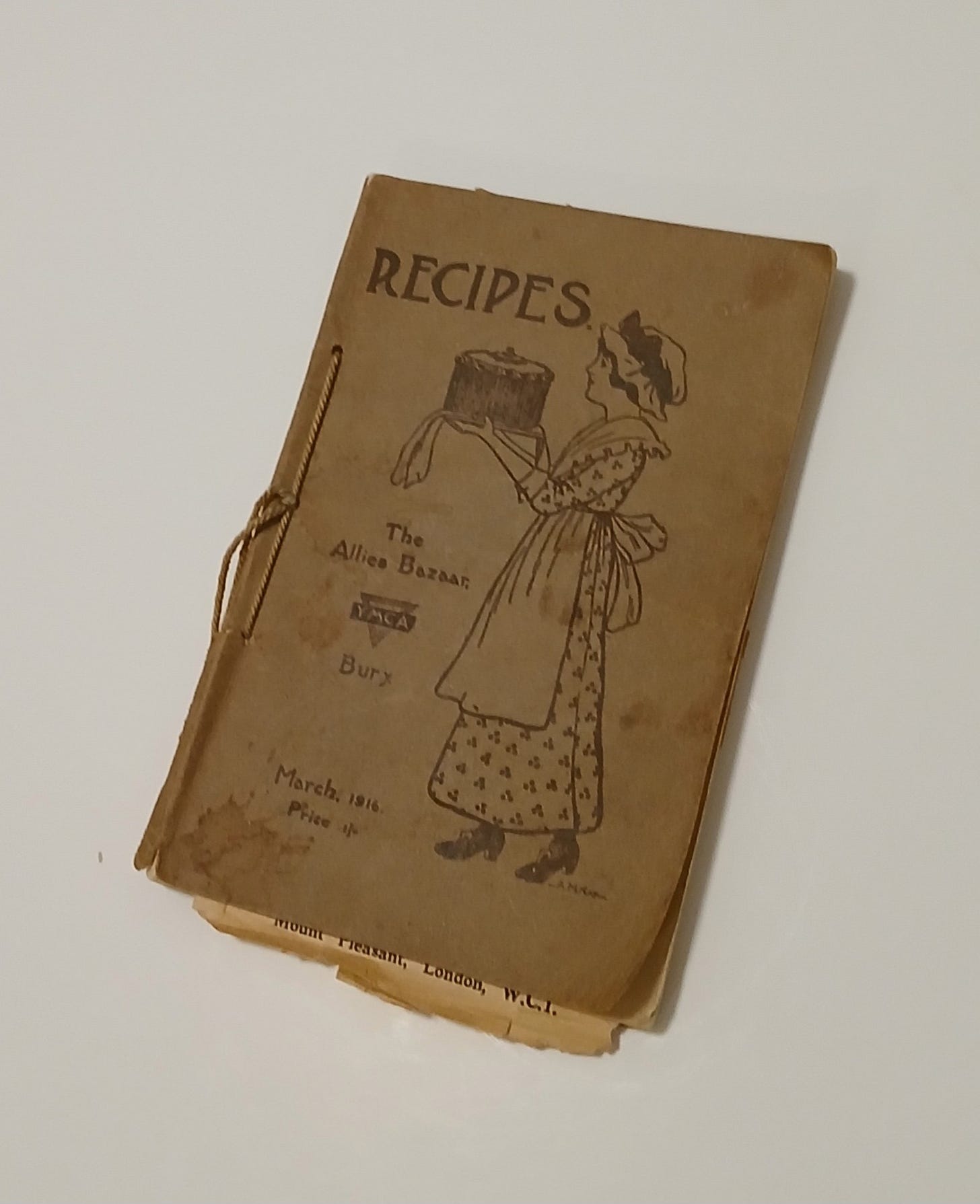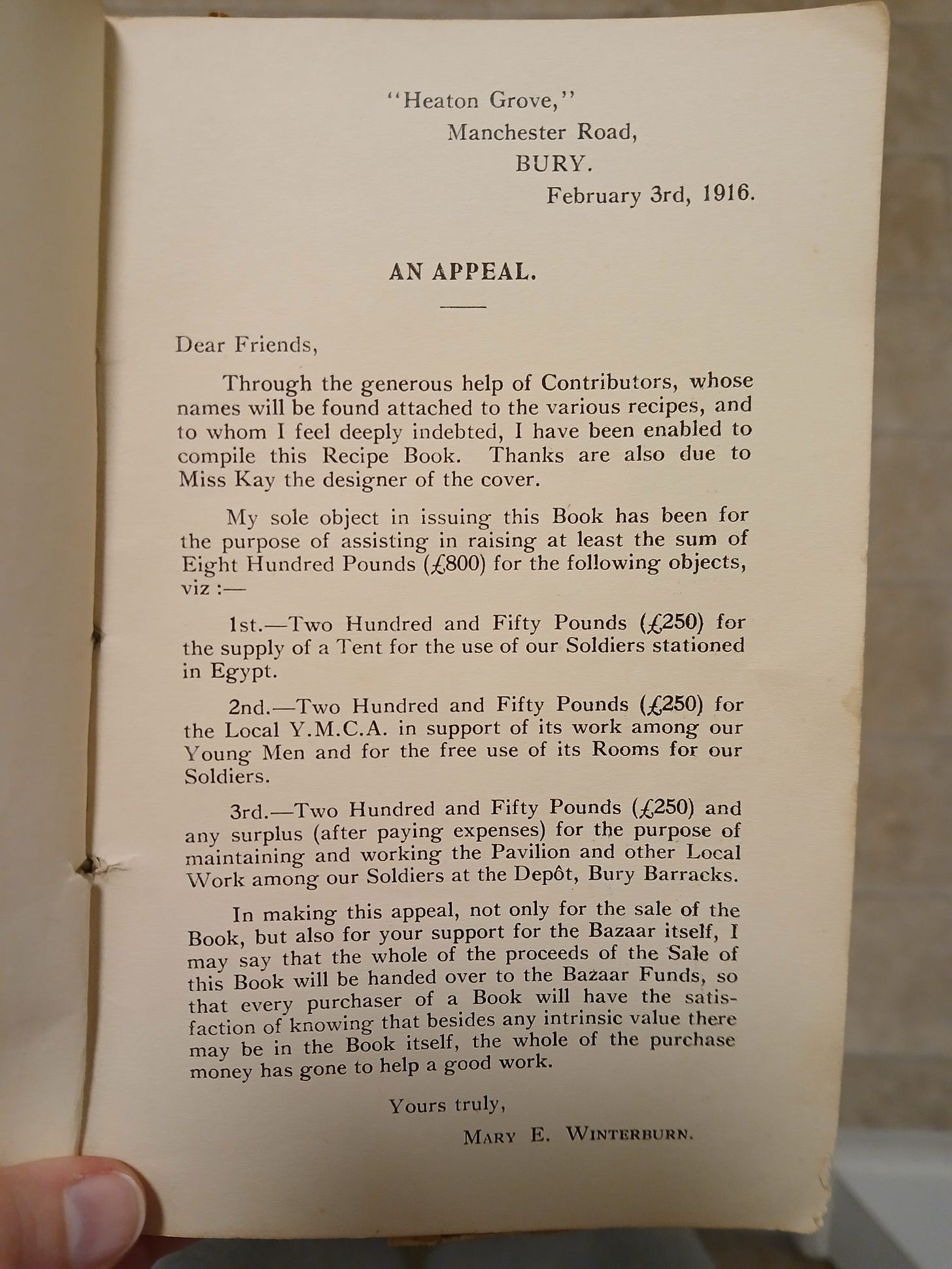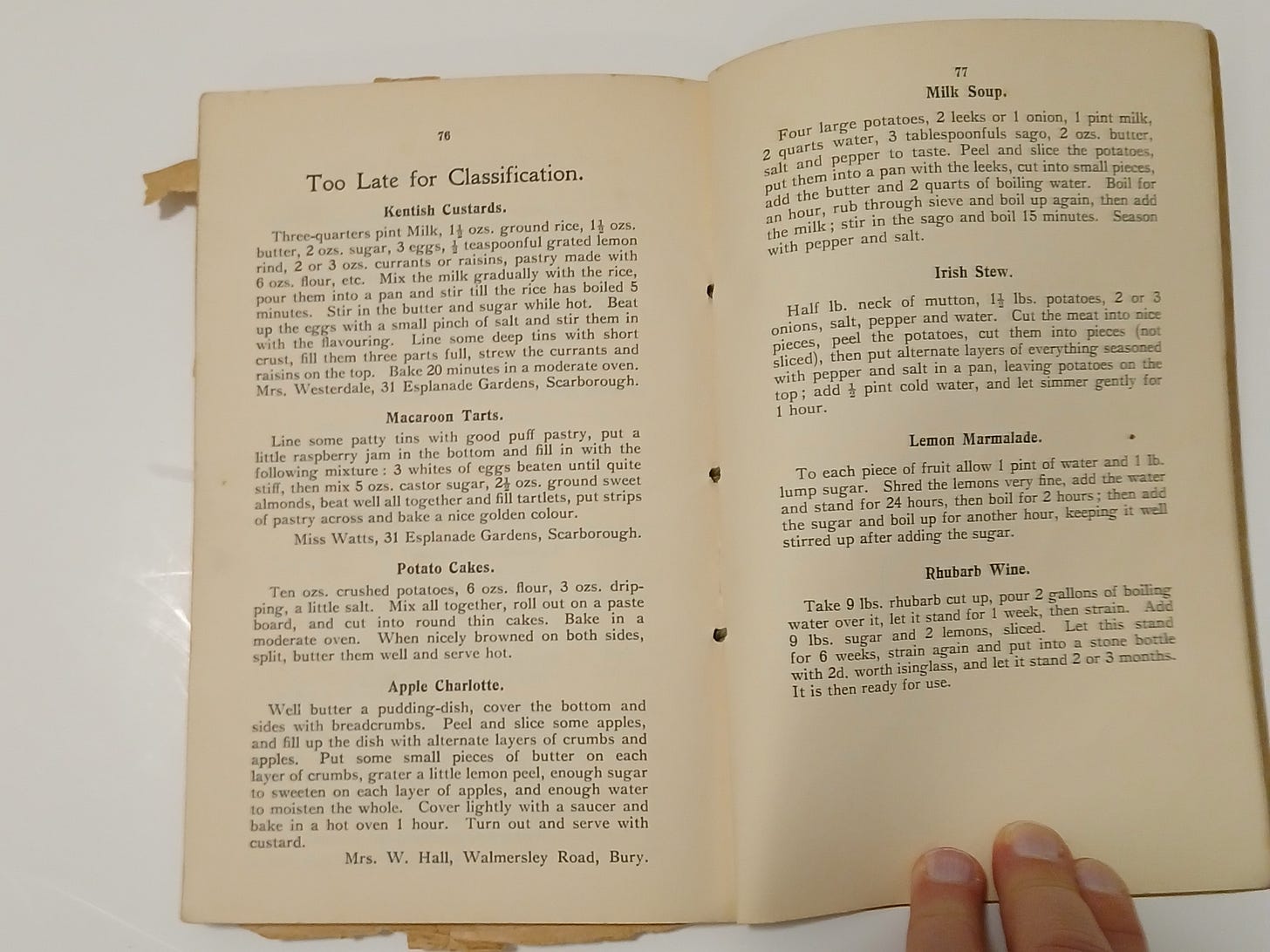Greetings, StoryGnatter!
Today’s StoryGnat is a) fairly random and b) quite long. But stay with me.
There’s a reason for the length. I can’t really send you anywhere else to find this story, because it’s both incomplete and not well documented online.
But it’s close to my heart.
It’s the story of a thin, simple-but-battered (and clearly well-used) recipe book that’s been passed down through generations of my dad’s family, and which now lives in my bookcase.
In many ways, it’s a bit of a mystery.
It seems to have been produced by a group of women in Bury (the Manchester one) in Feb/March 1916, in support of the war effort. That timing might be poignant, as January 1916 saw conscription introduced for the first time – no doubt bringing the impact of the conflict much closer to home for many of the women. The book seems to be raising money alongside an event called the Allies Bazaar, which they were also organising. I can’t find anything about this specific event, sadly.
My family has no links to the Bury area that we know of. My mum’s researched the family history thoroughly, and all I can think is that one of my dad’s family (up in Edinburgh) must have had a friend down that way who sent her a copy.
It’s spookily similar to a recipe book my cousin and her friends produced a few years ago in aid of a cancer charity – everyone sending in favourite recipes to be collated together. From the idea to the final execution, they’re really pretty similar.
And that, I think, is the point. That’s why I love it so much.
Even though it was produced more than a century ago, it’s really relatable. The recipes are attributed by name to the person who submitted them, often along with an address – making these women seem only just out of reach. I’d put money on there having been plenty of politics over whose recipes appeared in what order, and who sent in what… Something tells me at least some of these women were competitive.
The foreword is by a lady named Mary E Winterburn
Her address is given as “Heaton Grove” on Manchester Road, Bury. A quick online search shows a sizeable house – described as a Victorian mansion – which is now divided into (very nice) flats. I looked up quite a few of the addresses, and several of the ladies lived in houses that are now care homes. Others addresses mainly congregate around the same area. So yes, we’re talking the well-to-do women of Bury. Good on them for doing what they could (but I do wonder how many of them had to go asking their hired help for the recipes they entered).
Anyway, back to Mary Winterburn. I’m not sure what the relationship was, but the booklet was printed by WH Winterburn, which it seems was a printer’s in Bury from 1760-1999. And isn’t that, in itself, amazing?!
Mary clearly rounded up her family for recipes. I counted at least six other Winterburn women with different forenames and addresses. And while most of the contributions come from the local area, some clearly come from friends and family further afield. There’s a cluster of recipes from Wallington in Surrey – not Winterburns by name, but the plot thickened when I spotted that one of the Wallington crew lived in a house named Winterburn. I have so many questions.
The recipes each hint at more stories
They’re a mix of the truly relatable (tomato soup, Cornish pasties, ginger cake, dhal) and the slightly unsettling (cow-heel and beef mould, jugged hare, pigeon pie, irish moss jelly). I’m determined to try out one of the tamer ones one day.
Particular favourites (recipes and contributors) include:
Lady Parks, who submitted a recipe for “snow pancakes”. Yep, made using actual snow (fried “in the usual manner” 😂).
Colonel Barlow (seemingly the only male contributor) who gave a recipe for “Planters’ Punch”. It contains a fair quantity of rum, and the ingredients are listed in tiny print, unlike any other recipe in the book. It’s almost as if you have to whisper about such scandalous spirits. And the name of the drink suggests darker undercurrents and links to colonial plantations, perhaps.
The farthest-flung contributor is listed as being in Hong Kong. Again, there’s a story there. The contributor shares a surname with one of the local ladies who also gave a recipe, and I can’t help wonder if Mrs Sam Hamer in Hong Kong might not be the daughter-in-law of Mrs S Hamer of Woolford, Bury...
Another contributor – and the only one I’ve been able to definitively track down online – is Miss Kitchener, who was headmistress at Bury Grammar School (Girls). There’s a great picture of her online with her dog, Santo. And it seems that she was related, albeit a bit distantly, to Lord Kitchener of the “Your Country Needs YOU” recruitment posters.
A special mention to those few recipes at the end of the book under the heading “Too Late for Classification”. Several of these last minuters are named and shamed. Mrs Westerdale, Miss Watts and Mrs Hall – we’re looking at you.
My favourite line in the whole book, though, is this:
“A stew boiled is a stew spoiled.”
I suspect it’s meant as simple cooking advice, but I reckon it could be turned into a meaningful life motto (and probably a LinkedIn post complete with business lesson).
The book doesn’t just include food recipes, either. Oh, no.
There are some terrifying remedies which would make you think twice about ever being ill again (and which I’m pretty sure would make you ill, in many cases), and there are household recipes for cleaning and more. I’m particularly taken by one that’s all about keeping one’s aspidistra healthy. How very of the time.
Honestly, I could go on – and on.
The ladies of this book are just so familiar, so almost-within-but-just-out-of-reach. And underneath the jostling for position in the contents page and the one-upmanship of recipe choices, you know that they were likely terrified (or already grieving) for their sons, husbands and fathers.
So, ladies of Bury, I commend your initiative, your community spirit and your recipes. I hope it raised at least the £800 you were hoping for, and that your loved ones came home safe.
Next week, something completely different. Until then,
Meg









Ahh I loved this one! I grew up with a copy of this recipe book too and it's fascinating that it got outside of Bury 😍❤️
I grew up on the other side of Bury (still a middle class bit but less posh than the Manchester Road bit) so I wonder if the women passed them around in their social circles.